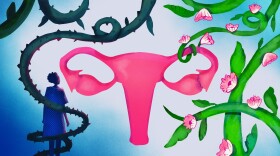
Nell Greenfieldboyce
Nell Greenfieldboyce is a NPR science correspondent.
With reporting focused on general science, NASA, and the intersection between technology and society, Greenfieldboyce has been on the science desk's technology beat since she joined NPR in 2005.
In that time Greenfieldboyce has reported on topics including the narwhals in Greenland, the ending of the space shuttle program, and the reasons why independent truckers don't want electronic tracking in their cabs.
Much of Greenfieldboyce's reporting reflects an interest in discovering how applied science and technology connects with people and culture. She has worked on stories spanning issues such as pet cloning, gene therapy, ballistics, and federal regulation of new technology.
Prior to NPR, Greenfieldboyce spent a decade working in print, mostly magazines including U.S. News & World Report and New Scientist.
A graduate of Johns Hopkins, earning her Bachelor's of Arts degree in social sciences and a Master's of Arts degree in science writing, Greenfieldboyce taught science writing for four years at the university. She was honored for her talents with the Evert Clark/Seth Payne Award for Young Science Journalists.
-
NASA plans to test launch its newest rocket — one it hopes will eventually take astronauts back to the moon. But the rocket's big price tag has some critics skeptical about its future.
-
Monday, NASA plans to launch a new rocket and capsule to the moon. If all goes well, the next mission will send people back to lunar orbit for the first time in 50 years.
-
NASA plans to test launch its newest rocket next week — one it hopes will eventually take astronauts back to the moon. But the rocket's big price tag has some critics skeptical about its future.
-
Humans' ability to sweat is useful on Earth — but when people go up into space, they find that perspiring in zero gravity presents some unique challenges.
-
A 30-year, nationwide study of ecological changes — including the effects of climate warming — has been releasing a powerful greenhouse gas, and critics want it to stop.
-
In the week since the first images from the James Webb Space Telescope were unveiled, astronomers have been poring through all the observations it's made so far--and they're happily overwhelmed.
-
In the week since the first James Webb Space Telescope images were unveiled, astronomers have been poring over all its observations so far. What they've seen has them giddy.
-
Doctors say they're seeing a surge in the number of women who want their "tubes tied." But hospital capacity, paperwork, religion and personal opinion are just some of the reasons requests get denied.
-
The largest bacteria known to science have been discovered in the Caribbean. They're visible to the naked eye and surprisingly complex.
-
An isolated population of polar bears in southeast Greenland has learned to hunt on freshwater glacier ice. That means they may be able to survive longer as climate change makes sea ice scarce.





